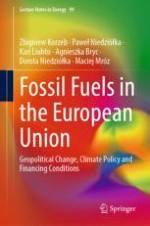This book identifies scenarios for changes in transmission infrastructure, contracting, consumption patterns and fossil fuel financing policies, considering climate goals and the consequences of the conflict in Ukraine.
The invasion of Ukraine by the Russian Federation has fundamentally changed the geopolitical situation, approaches to energy security issues, the EU’s energy (in)dependence and the implementation of previously outlined climate policies, including the planned gradual withdrawal from fossil fuels.
This book presents the geopolitical architecture, energy mix, energy fuel supply structure, long-term energy policy and financing conditions of the oil and gas and sectors in the EU in the period preceding and following the Russian invasion of Ukraine. The authors consider the date of Russia’s attack on Ukraine as a symbolic caesura marking the beginning of the process of creating a new energy order in the EU.
A novel part of the book is the attention it pays to the role of the credit and investment policy of the EU banking sector in relation to carbon-intensive sectors and to the significance of the financial system from the point of view of the effectiveness of international sanctions imposed on the Russian Federation, including, above all, sanctions related to the fossil fuel sector. The book is of interest to researchers and all those interested in learning about these subjects.
